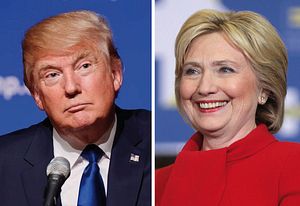Four days after the Paris Agreement goes into force, the United States will hold its presidential election. Republican presidential nominee Donald Trump has said in the past that he would “cancel the Paris climate agreement,” prompting a reporter to ask China’s special representative for climate change affairs, Xie Zhenhua, how the country would work with Trump on the issue.
According to the Wall Street Journal, Xie said, “I don’t think ordinary people would agree if you were to reject that trend.” He went on to say, “I’m convinced, if it’s a wise leader — especially a political leader — he ought to know that all his policies should conform to the trends of global development.” It was a rare comment on a foreign country’s political process.
Cooperation on climate change has been a relative bright spot in U.S.-China relations of late, shining even from under the shadow of the South China Sea troubles.
Ahead of the G20 summit in September, U.S. President Barack Obama stood on a stage in Hangzhou, China along with his Chinese counterpart, Xi Jinping, to formally announce that the two countries had ratified the Paris Agreement. The climate deal, reached at last year’s UN conference on climate change, seeks to hold the rise in global temperatures below 2 degrees Celsius and shift away from fossil fuel usage.
Obama predicted that “someday we may see this as the moment that we finally decided to save our planet.”
In the weeks after China and the United States “forged a historic partnership… to lead in combating climate change,” a slew of countries around the world pushed to ratify.
Between them, Beijing and Washington account for 38 percent of global emissions. In order for the agreement to go into force, 55 countries covering at least 55 percent of global emissions needed to ratify. Before the United States and China did so, only 23 countries had ratified, accounting for barely more than 1 percent of global emissions. The agreement has now been ratified by 89 countries and will go into force for many on November 4.
The pending U.S. election seemed to add extra motivation for the United States and China to ratify the Paris Agreement. Li Shuo, a climate adviser with Greenpeace, told Reuters that the United States and China were both eager to get the agreement into force ahead of the election.
Republicans have criticized Obama for pushing through with the climate change agreement without consulting Congress. While legal scholars say Obama was within the bounds of his executive authority to pursue the deal, the political repercussion is that once more climate change has been cast as a partisan issue.
Trump’s campaign website doesn’t list a specific climate change policy but he’s widely described as a critic. In 2012, Trump tweeted, “The concept of global warming was created by and for the Chinese in order to make U.S. manufacturing non-competitive.” Politifact commented in an assessment of statements that Trump had called climate change a “hoax” that he “certainly has a lengthy record of using the word ‘hoax’ to describe climate change.”
While China has been the target of criticism from both Clinton and Trump on the campaign trail, Clinton has categorized climate change as an “urgent threat” and pledged to uphold the Paris agreement.
At present, the U.S. and China, as the top emitters and largest economies, share the mantle of leadership in dealing with climate change. A future U.S. president walking back American commitment to combating climate change — something an overwhelming majority of people in both the U.S. and China view as a serious issue — would be seen as an abdication of leadership, further eroding global trust in Washington.
As the United States heads to the polls next week, the next round of global climate talks kicks off in Marrakesh, Morocco.

































